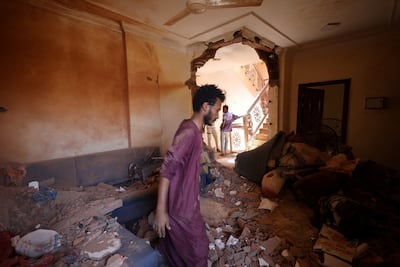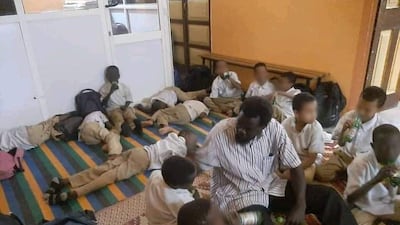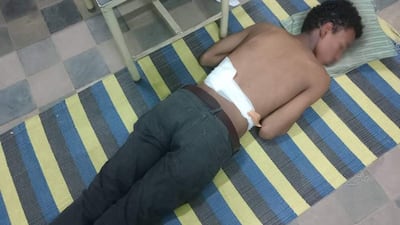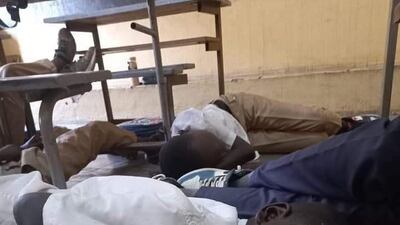Follow the latest news from the Sudan crisis here
On Saturday morning, Rania and Sharaf Al Din's children, Mohammad and Hassan, left their home at 6.30am thinking it would be just another day at school.
Less than three hours later, shelling began in Sudan.
"They had been at school for two hours and remained stuck there until 5.30pm. That is, from 9.30am, we were unable to reach the school," Rania, a mother of five, told The National.
Their father walked on foot for three hours amid shelling, rockets and gunfire by the Rapid Support Forces (RSF) and the military to reach his children, Rania said.
"The school principal was sending out distress calls to the parents. They were able to lock the children all up in the classrooms and made them lay down on the floor of their classrooms. One child, my eldest son's friend, was hit by a stray bullet in the back.
"We were living in fear."
Rania was unable to see her children until the next day as their father had taken them to a close relative's home in Khartoum.
On Sunday, a three-hour UN-brokered ceasefire was announced. It collapsed shortly after it began but Rania's husband and the children managed to make their way home.
She said the RSF had "stopped my kids and their father on their way to me. But upon seeing them in their school clothes, they were let go."
'Bleeding at home'
As the battles rage on for a fifth day, some residents are running out of food and water. Others, it is claimed, are being left bleeding at home, unable to receive assistance from medical teams that are also being attacked.
"I can't describe what's happening on the streets because we're not leaving our home," Sulaima Issac Issa, 47, told The National. "All we do is hear the shelling and gunfire. There aren't even sirens to warn us when a rocket has been fired. There is no such alarm system. We weren't even told beforehand to prepare ourselves or to stock up on food and supplies before this all began.
"I am just staying here at home with my children and watching the news and staying up to date on social media. There is no clear way out, no safe corridors and the shelling often begins in the early hours of the morning, at 4am."

"The situation is terrifying and gloomy.
"We're only able to go to the grocers nearby at 3am when it's slightly quieter, to get more supplies. Otherwise, the neighbourhood is a ghost town. Everything is closed. There are no people on the streets."
Footage seen by The National showed bodies of RSF fighters on the streets, wrapped in blankets, with pools of what appears to be blood nearby.
"People are getting retraumatised by the sound of gunfire," she said, referring to the violence of 2019 when hundreds of people were shot during protests that toppled dictator Omar Al Bashir.
Living in a warzone
Ola Adil is living with her mother and sister in Kafouri, Khartoum.
From her window, she is able to see rockets being launched by the RSF.
"We are living literally among RSF housing camps.
"Sudanese army forces have been trying to target them all since Saturday."
She says some RSF members have left their positions and are taking shelter in residents' homes.
With frequent power cuts compounding their problems, residents are having to charge their phones in their cars to let their loved ones know that they are still alive.
On Wednesday, the Committee of Sudan's Doctors' Union said ambulances were being targeted and have been unable to reach the injured. Electricity and fuel shortages mean hospitals are severely under-equipped. Many hospitals have been destroyed and others have been forcibly evacuated.
"So many of our neighbours have been killed," Ms Adil, a student, says.
"May their souls rest in peace."




